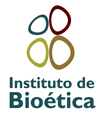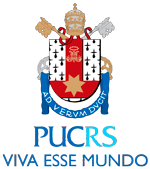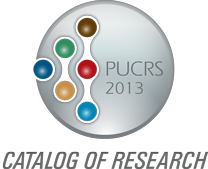Foreword
Research Structures
Energy, Environment, and Biodiversity
- Metallic Materials Engineering
- Solar Energy
- Biodiversity and Ecosystems in Fields and Forests of the Atlantic Forest
- Economic, Human, and Environmental Development
- Primatology
- Genetics, Evolution, Ecology, and Conservation of Carnivores
- Oleochemistry: Processes and Products
- Technologies to Mitigate Environmental Impacts
- Ichthyology
- Ornithology
- The Center for Wind Energy
Humanities and Ethics
- Fundamental Rights
- Theological and Ethical Anthropology
- The Political Authoritarianism and Press in Contemporary Brazil
- Christology within the Contemporary Latin American Context
- Law and Bioethics
- Clinical Bioethics
- Ecclesiology and Emergent Problems
- Analytic Epistemology
- Ethics, Contemporaneity, and Deconstruction: The Philosophical Criticism of Violence
- Immigration, Towns, and Foreigners Narratives of Brazil (1864–1964)
- Criminal Procedure and Democratic Rule of Law
Culture and Education
- Southern Writers Collection
- Architecture and Heritage
- Culture, Subjectivity, and Formative Policies
- Between the Memories and Stories of Schools at Rio Grande do Sul: From the Deutscher Hilfsverein to Farroupilha School (1858-2008)
- Enunciation and Discourse
- Education for Health and Inclusive Education
- Teaching of Physics
- Format Y: Formation in Mathematics for Generation Y
- History of Literature: The Investigation and Diffusion of Sources
- Reading Literature: The School and Other Social Agencies
- Chemical Education
- Relationship between the Nature of Science and Science Education
- Literature, History, and Theories on the Imaginary
- Training of Professors, Licentiates, and Pedagogical Practices
Society and Development
- Companies and Organizations
- Law and Economy
- Study and Research on Violence
- Family, Social Work, and Health
- Architecture and Industrialization
- Agribusiness
- Social Well-being Economics
- Applied Mathematics
- Class Action Lawsuits
- Psychology and Social Policies: Memory, History, and Production of the Present Time
- Inter-organizational Relationships and Systemic Competitiveness
- Parties, Elections, and Political Communication
- Fundamental Principles of Tax Law
- Social Demands and Policies
Information and Communication Technology
- Wireless, Wired, and Optic Communications
- Organizational Communication
- Strategy and Innovation
- Hardware Project Support
- Computing Molecular Biophysics – The Modeling and Simulation of Biosystems
- Technological Development in Telehealth
- Resource Management and Virtualization
- GThe Management and Governance of Information Technology
- International News at the Global Village
- Communication Science
- Ubiquity and Technological Convergences in Communication
- Aerospace Research
- The Performance Evaluation Group
- The Group on Systems, Signals, and Computing
Biology and Health
- Cancer and Other Pathologies of the Oral and Maxillofacial Region
- Memory
- Molecular and Functional Biology
- Cardiometabolic Risk, Aging, and Nutrition
- Health Education and Work
- Structural Biochemistry
- Pediatric Respirology
- Applied Pharmacology: Characterization of Mechanisms Involved in Pain, Inflammation and Cancer
- Immunology and Immunodiagnostics
- Nephrology
- Neurosciences
- Orthodontics
- The Promotion of Health in Longevity
- Olympic Studies and Health Sciences
- Nerve Regeneration
- Intensive Neonatal Medicine and Congenital Infections
- Aerospace Pharmacy
- Medical Imaging
- Pulmonology
- Orofacial Pain and Temporomandibular Disorders
- Metabolic Transformations of Purines of Biological Importance
- The Study of Parasitosis, Biochemical Parameters, and Hematological Parameters Associated with Aging
- Aerospace Science
- Bioethics and Ethics Applied to Animals
- Pharmacovigilance
- Evaluation and Intervention in the Life Cycle
- Surgery for Obesity and Metabolic Syndrome
- Modification of Lifestyle and Cardiovascular Risk
- Nanostructures and Nanoscopy
- Clinical and Experimental Neuropsychology
- Psychology of Occupational Health
- Memory and Neurodegeneration
- Epidemiology, Neurology, and Immunology
- Chemistry of Natural Products
- Health Economics
Research Structures and Researchers
- RESEARCH STRUCTURES AND RESEARCHERS
- Business School: Management, Accounting and Economics (FACE)
- School of Architecture and Urbanism (FAU)
- School of Biosciences (FABIO)
- School of Aeronautical Sciences (FACA)
- School of Social Communication (FAMECOS)
- Law School (FADIR)
- School of Education (FACED)
- School of Physical Education and Sport Science (FEFID)
- School of Nursing, Nutrition and Physiotherapy (FAENFI)
- School of Engineering (FENG)
- School of Pharmacy (FFARM)
- School of Philosophy and Human Sciences (FFCH)
- School of Physics (FAFIS)
- School of Computer Science (FACIN)
- School of Letters: Languages, Linguistics and Literature (FALE)
- School of Mathematics (FAMAT)
- School of Medicine (FAMED)
- School of Dentistry (FO)
- School of Psychology (FAPSI)
- School of Chemistry (FAQUI)
- School of Social Work (FSS)
- School of Theology (FATEO)
- Institute of Bioethics (IB)
- Institute of Geriatrics and Gerontology (IGG)
- Institute of Research and Development (IDÉIA)
- Institute of Biomedical Research (IPB)
- Institute of Toxicology and Pharmacology (INTOX)
- Institute of the Brain (InsCer)
- Institute of Environment and Natural Resources (IMA)
- Museum of Sciences and Technology (MCT)
The University has several Institutes that are dedicated to research, teaching, and the expansion and development of the culture in specific areas. These three areas of operation are promoted and maintained with high quality standards in articulation with the Academic Units of the University. There is an emphasis on interdisciplinary projects, whose objectives are to associate different areas of knowledge, join teaching and research, and encourage activities related to the performed research.
Bioethics Institute (IB)
www.pucrs.br/ib
 The Bioethics Institute (IB) was created in 2007. It has
the objectives of promoting and developing philosophical,
methodological, and scientific investigation in the field of
bioethics; training towards technically, scientifically, and
ethically improving human resources in bioethics in a permanent
manner; creating and designing resources to disseminate the
scientific production of the University in bioethics; disseminating
bioethics culture, from the integration of the University with the
community in general; and strengthening the University as a
reference in bioethics in national and international terms.
The Bioethics Institute (IB) was created in 2007. It has
the objectives of promoting and developing philosophical,
methodological, and scientific investigation in the field of
bioethics; training towards technically, scientifically, and
ethically improving human resources in bioethics in a permanent
manner; creating and designing resources to disseminate the
scientific production of the University in bioethics; disseminating
bioethics culture, from the integration of the University with the
community in general; and strengthening the University as a
reference in bioethics in national and international terms.
The interdisciplinary Specialization Program in Bioethics of IB aims to provide a basic and integral vision of bioethics, sparking the interest of the participant in the reflection and debate of bioethics problems, whether they are philosophical, scientific, legal, health-related, environmental, or economic, and training participants for activities in Hospital Ethics Committees and for research on human beings or animals.
IB acts in international partnership with the Joint Bioethics Teaching Network and Global Bioethics and the AECI Bioethics Teaching Network.
Brain Institute of Rio Grande do Sul (InsCer)
www.pucrs.br/inscer
 The Brain Institute of Rio Grande do Sul (InsCer) is a reference
center in the treatment and investigation of neurological
diseases, interdisciplinary research in neuroscience, and
cellular therapy in Brazil. InsCer was founded as an innovative
proposal and is unequaled in Latin America: it is a center that
combines patient care, cutting-edge research, and the most
advanced diagnostic technologies.
The Brain Institute of Rio Grande do Sul (InsCer) is a reference
center in the treatment and investigation of neurological
diseases, interdisciplinary research in neuroscience, and
cellular therapy in Brazil. InsCer was founded as an innovative
proposal and is unequaled in Latin America: it is a center that
combines patient care, cutting-edge research, and the most
advanced diagnostic technologies.
The alliance between research and clinical studies has the potential to leverage the treatment standards of the treatment of neurological, neuro-oncological, neurovascular, and neurodegenerative diseases, such as epilepsy, Alzheimer’s disease, and Parkinson’s disease.
The Institute is served by the Unified Health System (SUS) and performs experimental, pre-clinical, and clinical research to generate and spread knowledge for the entire population.
Institute of Geriatrics and Gerontology (IGG)
www.pucrs.br/igg
 The Institute of Geriatrics and Gerontology (IGG) was created
in 1973 and implemented in 1975 as the first cooperative project
established by the Japan International Cooperation Agency (JICA)
in Latin America. It is a pioneering institution in the training of
personnel to work in geriatric practice and to develop knowledge on
the aging process.
The Institute of Geriatrics and Gerontology (IGG) was created
in 1973 and implemented in 1975 as the first cooperative project
established by the Japan International Cooperation Agency (JICA)
in Latin America. It is a pioneering institution in the training of
personnel to work in geriatric practice and to develop knowledge on
the aging process.
The main objectives of the Institute are the teaching of graduate students and the development of research in the field of aging, annually offering graduate courses at the levels of specialization, master’s, doctorate, medical residence, and extension in geriatric and assistance.
To perform its work, the Institute has laboratories for basic and clinical research and also maintains an outpatient service that treats the general public and an inpatient hospital service connected to the São Lucas Hospital (HSL) of PUCRS. With this, the IGG provides Brazilian professionals with the opportunity for systematic contact with the most advanced studies in the field of human aging and the prevention and treatment of diseases characteristic of advanced age.
Institute of the Envionment and Natural Resources (IMA)
www.pucrs.br/ima
 The Institute of the Environment and Natural Resources (IMA)
was created in 1998. It has the objective of encouraging and
promoting activities in the University and the community related
to the preservation of the environment.
The Institute of the Environment and Natural Resources (IMA)
was created in 1998. It has the objective of encouraging and
promoting activities in the University and the community related
to the preservation of the environment.
The IMA manages the ‘Pró-Mata’ Research Center and Nature Conservancy, located in the municipality of São Francisco de Paula in the state of Rio Grande do Sul, which is geared toward the interaction of humans with nature. The ‘Pró-Mata’ project was developed from the idea of creating a conservation area of approximately 4,500 ha for research and conservation of nature, proposed by the University of Tübingen in Germany, with which PUCR has had a cooperative agreement since 1983.
The Center of Excellence in Research and Innovation on Petroleum, Mineral Resources and Carbon Storage (Cepac) is the first Brazilian center for excellence in the research and development of technologies for industries involved with petroleum, mineral resources, and the geological storage of CO2. It constitutes a joint initiative between PETROBRAS and PUCRS through the IMA.
The IMA also includes the Committee on Environmental Management of PUCRS (CGA), which has the objective of supporting the University Higher Administration in the formulation of policies and actions aimed at the environmental management of the campuses. Other objectives are to encourage, approve, and promote activities related to the conservation of the environment in the University and in the community involved through administrative procedures, teaching, research, and extension activities.
Biomedical Research Institute (IPB)
www.pucrs.br/ipb
 The Biomedical Research Institute (IPB) was created in
1997. It is a center that develops technology and knowledge
to improve the understanding, prevention, and treatment
of diseases that affect the Brazilian population. IPB, in
partnership with the São Lucas Hospital (HSL) of PUCRS,
is a pioneer in stem cell research. It has the objective of
developing high-quality research to improve diagnostics,
prevention, and treatment of diseases to promote and foster
the communication and application of this information and
related discoveries in society.
The Biomedical Research Institute (IPB) was created in
1997. It is a center that develops technology and knowledge
to improve the understanding, prevention, and treatment
of diseases that affect the Brazilian population. IPB, in
partnership with the São Lucas Hospital (HSL) of PUCRS,
is a pioneer in stem cell research. It has the objective of
developing high-quality research to improve diagnostics,
prevention, and treatment of diseases to promote and foster
the communication and application of this information and
related discoveries in society.
IPB is a center of excellence in biomedical research, developing projects in basic research, elucidating pathophysiological mechanisms, and the application of advanced technologies, with an emphasis on translational studies. These activities are developed through a network of partnerships with different laboratories and centers of the Institute with national and international research centers.
Institute of Toxicology and Pharmacology (INTOX)
www.pucrs.br/intox
 The Institute of Toxicology and Pharmacology (INTOX) is a
interdisciplinary unit dedicated to research, teaching, extension,
and service-providing activities with an emphasis on the
training of human resources, in addition to quality scientific and
innovative production.
The Institute of Toxicology and Pharmacology (INTOX) is a
interdisciplinary unit dedicated to research, teaching, extension,
and service-providing activities with an emphasis on the
training of human resources, in addition to quality scientific and
innovative production.
INTOX was created in 1991 with the following objectives: performing extension activities linked to research projects or teaching of graduate students in the field of toxicology, offering support to research and teaching activities in the field of toxicology developed by other university units, and supporting community actions in the field of toxicology offered by other university units and supplementary agencies of PUCRS. It offers a specialization program in applied toxicology and research in the fields of medications, drug abuse, and forensic and occupational toxicology.




